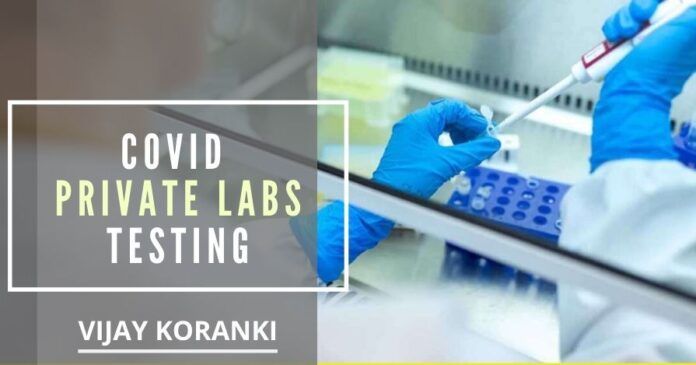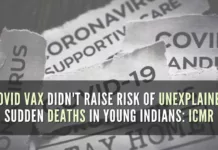
The final result of the order may hinder rather than help the fight against the virus.
Following the Supreme Court’s hurried decision on making all COVID-19 testing free, a controversy has erupted – the private labs insisting that they cannot afford to provide tests for free and an aggressive media projecting their resistance as ‘profiteering’ at a time of crisis.
I think the decision was hurried because the court did not consult the labs and gave an ex parte decision on a PIL filed by an ‘activist’. The labs were not asked by the court on the possible effects of such an order. The order may reduce the testing capacity of the country, instead of increasing it. Imagine, for a moment, that such a decision had been passed six or seven weeks ago. Most of the labs which are now ready to test may have chosen to shy away from investing the time, money and effort to acquire the capacity to test, leaving just the government labs to conduct the testing. Or, the scenario where small labs that do not have the financial muscle comply with the decision and close down due to cash flow issues. It is illegal and immoral to expect the companies to forego their need to survive. The final result of the order may hinder rather than help the fight against the virus.
In the UK there are labs that charge £387 per test if the patient goes totally private, bypassing the NHS system.
The row is also centered on whether the private labs can afford the cash flow issue, though the term cash flow was not used explicitly. It will depend on each lab and its financial muscle. Without looking in detail at their financial statements it is impossible to come to a conclusion either way. A lab needs inputs to do the testing which costs money, mere goodwill to help is not sufficient. A good guess is that some of them will not be able to survive and may close down. In any case, the labs will now become hesitant to increase their testing capacity. Taking a running cost of about Rs 2,500 per test and an anticipated maximum of 100,000 tests per day, the cost could run into Rs 25 crores per day for the labs and it will be unrealistic to expect them to bear this cost. Closing down may be a better option for some labs, especially if it looks inevitable in the end.
GOI can follow the outsourcing model of the NHS
The judge could have said that the GOI needs to explore ways of providing tests for free for those who cannot pay for it. What I propose is a solution to this tangle. The GOI can follow the National Health Service (NHS) outsourcing model. For performing routine procedures like the collection of blood samples for testing, et al the NHS uses outsourcing at an agreed cost which eliminates the need for NHS to fund initial capital expenditure on labs, equipment, and training. Some routine surgical procedures are also outsourced. The NHS decides what procedures are to be performed and the private medical services execute them at a pre-agreed cost.
I propose that the GOI splits the COVID testing into two categories.
- The first category will consist of patients who cannot pay for the tests and GOI will refer them to the private labs which will conduct the tests at a pre-agreed cost. The labs will function as sub-contractors for the GOI.
- The second category will consist of patients who want to get tested and can afford to pay for it. For this category, the upper limit on charge for testing can be abolished. In the UK there are labs that charge £387 per test if the patient goes totally private, bypassing the NHS system. The cost is unaffordable for all who do not belong to a wealthy elite. But the NHS testing is restricted to those who meet the criteria based on vulnerability and risk assessment. (No, there is no country where one can turn up and ask for a free antigen test without meeting the criteria set. A 36-year-old woman in London was diagnosed as having COVID symptoms but was not referred for antigen testing as her case was not considered to be a priority. She died the next day leaving her husband and three children behind) The private patient can get tested without meeting the criteria, and will also jump the NHS queue. Indeed, a lot of private medical insurance in the UK is marketed with the selling point of jumping the NHS queue.
In PPP terms, £387 will be about Rs 140,000. Let the private labs charge what they will, their cost price or INR 200,000 or a charge depending on the social strata. And let the rich pay for the testing of the poor, if the lab so desires, a Robin Hood charging strategy.
The finance ministry can use its influence with the banks to ensure that the labs will keep running. Labs closing down is the last thing that India needs now.
In this proposal, the money owed by GOI to the labs will go into cash that is expected to flow in. This expected payment due from GOI can be used by the labs as a guarantee against which money for current expenditure for testing can be borrowed. The money owed by GOI can underwrite the borrowings for running costs for the tests.
Finally, the finance ministry can use its influence with the banks to ensure that the labs will keep running. Labs closing down is the last thing that India needs now.
P.S.: The private labs and independently the Indian Council For Medical Research (ICMR) have moved the court to let the labs test at the price set by ICMR. The court has modified its verdict and made testing free only to those who cannot afford to pay, and are able to provide evidence that they cannot pay. Also, directed the GOI to pay the expenses of the labs. The arguments advanced in the court are almost identical to the ones given in the article. A completely unwarranted confusion due to the zeal of ‘activists’. I still maintain that for those who can afford, the upper limit a lab can charge needs to be lifted.
Note:
1. The views expressed here are those of the author and do not necessarily represent or reflect the views of PGurus.
- Funding Corona War - April 23, 2020
- COVID private labs testing - April 16, 2020










